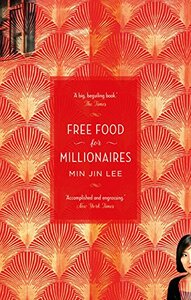Take a photo of a barcode or cover
challenging
informative
reflective
medium-paced
Plot or Character Driven:
Character
Strong character development:
Yes
Loveable characters:
No
Diverse cast of characters:
Yes
Flaws of characters a main focus:
Yes
relaxing
slow-paced
Plot or Character Driven:
Character
Strong character development:
Yes
Loveable characters:
Complicated
Diverse cast of characters:
Yes
Flaws of characters a main focus:
Yes
emotional
reflective
slow-paced
Plot or Character Driven:
Character
Strong character development:
Yes
Loveable characters:
Complicated
Diverse cast of characters:
Yes
Flaws of characters a main focus:
Yes
Wanted to love this. Some characters are so well drawn out and others seem very two dimensional. While the main character is compelling, the book meanders at times . Enjoyed it but not one I’ll likely come back to.
reflective
medium-paced
Plot or Character Driven:
Character
Strong character development:
Yes
Loveable characters:
Complicated
Diverse cast of characters:
Yes
Flaws of characters a main focus:
Yes
This book is amazing. The only reason it's not a 5 stars for me is only because the subject matter/ vibe could've been more my taste (e.g. the author's Patchinko). But beautifully written, long book but not a second when I got bored, great character building from the author. I would definitely recommend it to anyone who enjoys character driven stories.
emotional
reflective
medium-paced
Plot or Character Driven:
Character
Strong character development:
Yes
Loveable characters:
Complicated
Diverse cast of characters:
Yes
Flaws of characters a main focus:
Yes
Free Food for Millionaires is a massive, ambitious book with a very tight focus: the many permutations of love (and attendant concepts like sex and desire) in the contemporary world. The structure is clearly very carefully managed, so despite its length, it didn't feel like a slog to read.
This book reminds me a lot of Sally Rooney's work (though of course Min Jin Lee's novels predate Rooney's): in addition to their focus on contemporary love and sex, both are careful and thorough in exploring social class differences, and both spend a lot of time with the biblical concept of grace.
The characters are, for the most part, well developed, and we get to see their good and bad sides, their flaws and vulnerabilities. I absolutely can't stand Ted Kim, but he does feel like an accurate representation of a finbro (though maybe that's just my own biases showing).
I would have loved to read more of Joseph and Leah's stories, as Joseph's feels a bit underdeveloped, and Leah's big arc is introduced quite late. On the other hand, though, I appreciate the movement in the book from these characters being portrayed and seen as stubbornly patriarchal (Joseph) and meekly submissive (Leah) to more complex people with their own loves, sorrows, and ambitions. This structure mirrors Casey's evolving understanding of her parents as human beings, so I can't really fault it.
This book reminds me a lot of Sally Rooney's work (though of course Min Jin Lee's novels predate Rooney's): in addition to their focus on contemporary love and sex, both are careful and thorough in exploring social class differences, and both spend a lot of time with the biblical concept of grace.
The characters are, for the most part, well developed, and we get to see their good and bad sides, their flaws and vulnerabilities. I absolutely can't stand Ted Kim, but he does feel like an accurate representation of a finbro (though maybe that's just my own biases showing).
I would have loved to read more of Joseph and Leah's stories, as Joseph's feels a bit underdeveloped, and Leah's big arc is introduced quite late. On the other hand, though, I appreciate the movement in the book from these characters being portrayed and seen as stubbornly patriarchal (Joseph) and meekly submissive (Leah) to more complex people with their own loves, sorrows, and ambitions. This structure mirrors Casey's evolving understanding of her parents as human beings, so I can't really fault it.
Graphic: Infidelity, Rape, Classism
Moderate: Addiction, Adult/minor relationship, Body shaming, Death, Domestic abuse, Miscarriage, Misogyny, Sexual assault, Toxic relationship, Grief, Abortion, Suicide attempt, Toxic friendship, Alcohol, Sexual harassment
Minor: Death of parent, Pregnancy, War
Gambling addiction
This is the first book I started this year that I couldn’t finish - and I got all the way to page 337!!! before finally caving in and admitting to myself that I simply didn’t want to read 300 more pages.
Even though I couldn’t get through it, the book wasn’t terrible. It touches on some interesting themes, like: Korean-American identity and experience, the complexity of being a “poor” person (ie low income and mountains of debt) while having access to luxury goods and expensive experiences through social connections, and the selective generosity of the rich. However, the large majority of the plot centers around young people getting married and navigating the finance world and business school — as a queer anti-capitalist I couldn’t relate to this at all and really struggled to find it engaging or interesting. The book mostly meanders alongside the meanderings of the protagonist, Casey, and there isn’t a discernible plot, which would be fine if there was a deeper commentary on the characters, which there doesn’t seem to be either.
I came to this book after reading Pachinko—which was basically flawless IMO—so I was pretty shocked and disappointed that I struggled so much with this read. On the flip side, Min Jin Lee has really honed her craft since the release of this novel!
Even though I couldn’t get through it, the book wasn’t terrible. It touches on some interesting themes, like: Korean-American identity and experience, the complexity of being a “poor” person (ie low income and mountains of debt) while having access to luxury goods and expensive experiences through social connections, and the selective generosity of the rich. However, the large majority of the plot centers around young people getting married and navigating the finance world and business school — as a queer anti-capitalist I couldn’t relate to this at all and really struggled to find it engaging or interesting. The book mostly meanders alongside the meanderings of the protagonist, Casey, and there isn’t a discernible plot, which would be fine if there was a deeper commentary on the characters, which there doesn’t seem to be either.
I came to this book after reading Pachinko—which was basically flawless IMO—so I was pretty shocked and disappointed that I struggled so much with this read. On the flip side, Min Jin Lee has really honed her craft since the release of this novel!
emotional
reflective
sad
medium-paced
Plot or Character Driven:
Character
Loveable characters:
Complicated
Diverse cast of characters:
Yes
Flaws of characters a main focus:
Yes
adventurous
challenging
emotional
lighthearted
slow-paced
Plot or Character Driven:
Character
Strong character development:
Complicated
Loveable characters:
Complicated
Diverse cast of characters:
Yes
Flaws of characters a main focus:
Yes
what a nutty book. a sprawling, maximalist family drama centered around the financial woes and relationship struggles of a korean-american community in queens, new york. i loved how the book weaved in and out of different characters' perspectives - very galgut-esque and it kept a lightness and newness to the book at times when the plot could have dragged. min jin lee has a talent for making you root for someone to change their whole life even when you know they'll never learn: the faint, enduring hope that this time will be different. this book taught me to spend less and confirmed my already obvious distaste for investment banking.


